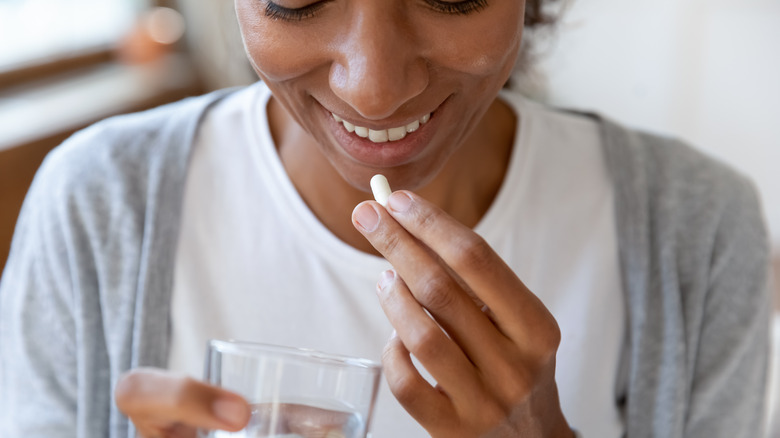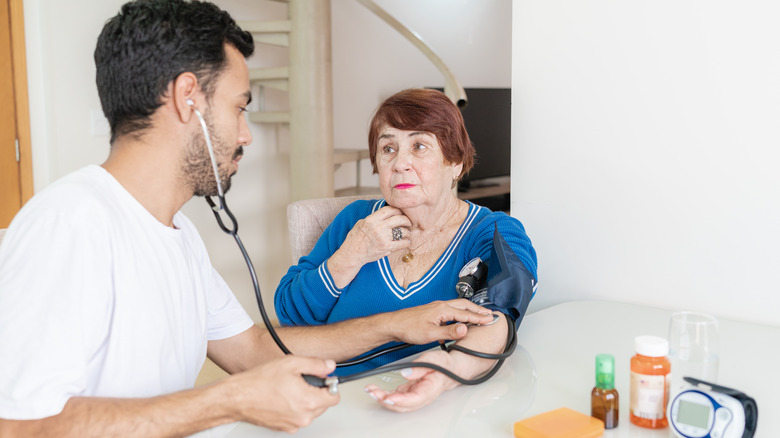Does Taking Probiotics Affect Your Blood Pressure?
Unlike bacteria that can lead to illness or disease, there is such a thing as good bacteria. Probiotics, for example, contain live microorganisms that aren't all that different from the kinds of bacteria harbored within our bodies. Found in supplements, beauty products, and certain food items such as yogurt, probiotics may aid in keeping your body's delicate microbiome balanced and healthy, according to the National Center for Complementary and Integrative Health.
While more research is still needed, some studies have shown that probiotics may support gastrointestinal health in a variety of ways, including symptom relief from irritable bowel syndrome (IBS), constipation, or antibiotic-associated diarrhea. However, are there ways in which probiotics may be beneficial to us that stem beyond just our digestive health?
A 2014 scientific review published in Hypertension set out to answer that question by examining nine studies involving over 500 total adults to see if probiotic usage had a potentially positive effect on patients' blood pressure.
People with elevated blood pressure may benefit from probiotics
In reviewing the studies, researchers determined that use of probiotics — particularly those containing multiple strains of bacteria — reduced elevated blood pressure in patients, per the American Heart Association (AHA). On average, those who consumed probiotics saw a decrease in systolic blood pressure by 3.56 millimeters of mercury (mm Hg), as well as an average 2.38 mm Hg drop in diastolic blood pressure. Length of treatment also proved to be relevant, as changes in blood pressure were only observed in patients after eight weeks of probiotic usage.
Offering a possible explanation for these findings, lead author on the study Dr. Jing Sun, told the AHA, "We believe probiotics might help lower blood pressure by having other positive effects on health, including improving total cholesterol and low-density lipoprotein, or LDL, cholesterol; reducing blood glucose and insulin resistance; and by helping to regulate the hormone system that regulates blood pressure and fluid balance." However, Dr. Sun acknowledges that further research is needed before probiotics could be considered an official clinical treatment for hypertension.
Methods for lowering blood pressure
A more recent scientific review from 2020 published in Lipids in Health and Disease looked at 23 controlled trials that in total included more than 2,000 participants in order to determine the effect of probiotic usage on patients' blood pressure. The study findings revealed that probiotic supplementation was linked with moderate to statistically significant decreases in systolic blood pressure and diastolic blood pressure in patients with high blood pressure. However, these findings were not long-lasting and only held true for approximately eight or ten weeks.
While research on the whole certainly looks promising, experts emphasize other lifestyle factors that individuals with hypertension can take into consideration when looking to lower their blood pressure. Such factors include getting regular exercise on a weekly basis, managing stress levels, limiting alcohol usage, and reducing sodium intake (via Penn Medicine). In addition to eating less salt, you can also help clear sodium out of your system by boosting potassium intake with foods such as sweet potatoes, yogurt, salmon, and more.
However, for those still interested in giving probiotic supplementation a try, be sure to consult with your physician. Probiotic usage is not advisable for everyone, including those with critical illness, compromised immunity, or who have recently undergone surgery (via Cleveland Clinic). Probiotics can also have potential side effects such as allergic reactions, mild upset stomach, bloating, diarrhea, or gas.



